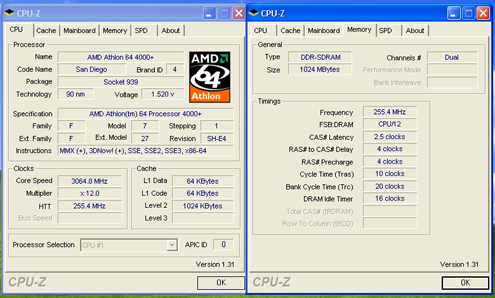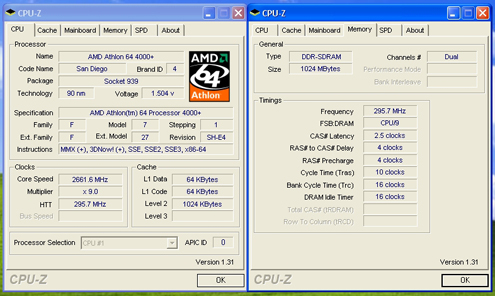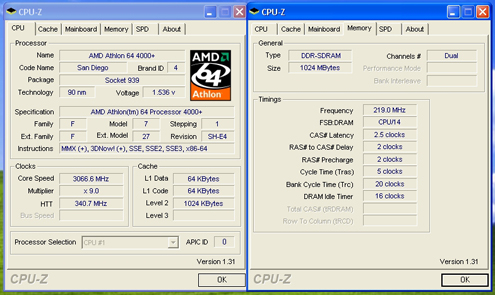nForce4 SLI Motherboards: Premium Performance at a Bargain Price
by Gary Key on January 3, 2006 12:05 AM EST- Posted in
- Motherboards
ASUS A8N-SLI Premium: Overclocking
FSB Overclocking Results
Memory Stress Testing
Memory stress tests look at the ability of the Asus A8N-SLI Premium to operate at the officially supported memory frequencies of 400MHz DDR, at the best performing memory timings that the OCZ Technology PC4800 Elite Platinum could support. The default setting for Command Rate in the Asus BIOS is 2T. You need to set Command Rate manually to 1T for best performance with 2 DIMMs in Dual Channel mode.
The Asus A8N-SLI Premium was completely stable with 2 DDR modules in Dual-Channel at the settings of 2-2-2-5 at the default 2.8V.
Tests with 4 double-sided DIMMs on an AMD Athlon 64 system are very demanding, since AMD specifies DDR333 for this combination. However, most AMD Athlon 64 motherboards combined with recent AMD processors have been able to handle 4 DIMMs at DDR400 settings.
The Asus A8N-SLI Premium was completely stable with 4 DDR modules in Dual-Channel at the settings of 2-2-2-7 at the default 2.8V.
FSB Overclocking Results
| Front Side Bus Overclocking Testbed | |
| Processor: | Athlon 64, 4000+, San Diego Core |
| CPU Voltage: | 1.5125V (1.4000V default) |
| Memory: | OCZ PC4800 Platinum Edition |
| Memory Voltage: | 2.95 |
| Cooling: | AMD Stock Heat sink and Fan |
| Power Supply: | OCZ Power Stream 520 |
| Maximum CPU Overclock Standard Ratio (12) |
255fsb x 12, 5x HT, (2.5-4-4-10, 1T) 3064MHz (+27%) |
| Maximum FSB Overclock Lowered Ratio (9) |
295fsb x 9, 4x HT, (2.5-4-4-10, 1T) 2661MHz (+47.5% Bus Overclock) |



Memory Stress Testing
Memory stress tests look at the ability of the Asus A8N-SLI Premium to operate at the officially supported memory frequencies of 400MHz DDR, at the best performing memory timings that the OCZ Technology PC4800 Elite Platinum could support. The default setting for Command Rate in the Asus BIOS is 2T. You need to set Command Rate manually to 1T for best performance with 2 DIMMs in Dual Channel mode.
| Asus A8N-SLI Premium Stable DDR400 Timings - 2 DIMMs (2/4 slots populated - 1 Dual-Channel Bank) |
|
| Clock Speed: | 200MHz |
| CAS Latency: | 2 |
| RAS to CAS Delay: | 2 |
| RAS Precharge: | 2 |
| RAS Cycle Time: | 5 |
| Voltage: | 2.8V |
| Command Rate: | 1T |
The Asus A8N-SLI Premium was completely stable with 2 DDR modules in Dual-Channel at the settings of 2-2-2-5 at the default 2.8V.
Tests with 4 double-sided DIMMs on an AMD Athlon 64 system are very demanding, since AMD specifies DDR333 for this combination. However, most AMD Athlon 64 motherboards combined with recent AMD processors have been able to handle 4 DIMMs at DDR400 settings.
| Asus A8N-SLI Premium Stable DDR400 Timings - 4 DIMMs (4/4 slots populated - 2 Dual-Channel Banks) |
|
| Clock Speed: | 200MHz |
| CAS Latency: | 2 |
| RAS to CAS Delay: | 2 |
| RAS Precharge: | 2 |
| RAS Cycle Time: | 7 |
| Voltage: | 2.8V |
| Command Rate: | 2T |
The Asus A8N-SLI Premium was completely stable with 4 DDR modules in Dual-Channel at the settings of 2-2-2-7 at the default 2.8V.










37 Comments
View All Comments
Gary Key - Wednesday, January 4, 2006 - link
As stated in the article the current pricing structure lends itself to the purchase of an SLI capable motherboard if the nForce4 is your chipset of choice. Even if you do not utilize SLI you at least have the option of doing so, if not for gaming, then for multiple monitor support and excellent performance utilizing two x8 lanes. If you look at the current support from the motherboard suppliers and product plans it is very obvious that SLI/CrossFire capable motherboards are becoming the standard across all price points. Our statements were based on these facts regarding the motherboard choices available. If you consider the potential cost/performance benefits then why pay the same amount of money for a board that is not capable of SLI or CrossFire and will probably not receive the same level of support over the lifespan of the product.
bob661 - Wednesday, January 4, 2006 - link
Isn't this a contradiction?
Capt Caveman - Tuesday, January 3, 2006 - link
What are you talking about? You can get a SLI board for $70.andlcool - Tuesday, January 3, 2006 - link
for the asus one, it should be ddr and not ddr2.ElFenix - Tuesday, January 3, 2006 - link
still, should be a good price for stock speed boardsElFenix - Tuesday, January 3, 2006 - link
looking at the first chart i mean. doesn't seem to fall off much eh?<--- wants an edit function
Gary Key - Tuesday, January 3, 2006 - link
The Foxconn board offered excellent stability throughout testing although it certainly is not targeted at the overclocking crowd. The performance was certainly acceptable and without the benchmarks you probably would not be able to tell the difference between it and the other boards. The layout is really nice unless you plan on utilizing two video cards with two slot cooling solutions as the space becomes very tight between the two x16 slots.I would like an edit function also. ;->